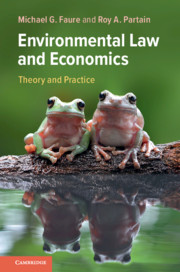Book contents
- Environmental Law and Economics
- Environmental Law and Economics
- Copyright page
- Contents
- Preface
- Acknowledgements
- Abbreviations
- 1 Introduction
- 2 Environmental Harm and Efficiency
- 3 Property Rights Approach to Environmental Law
- 4 Environmental Standard Setting
- 5 Principles of Environmental Law and Environmental Economics
- 6 Pricing Environmental Harm
- 7 Market-Based Instruments
- 8 Liability Rules
- 9 Environmental Regulation
- 10 Environmental Crime
- 11 Insurance for Environmental Damage
- 12 Compensation for Environmental Damage
- 13 Environmental Federalism
- 14 The Role of Environmental Law in Developing Countries
- 15 Epilogue
- References
- Index
8 - Liability Rules
Published online by Cambridge University Press: 13 September 2019
- Environmental Law and Economics
- Environmental Law and Economics
- Copyright page
- Contents
- Preface
- Acknowledgements
- Abbreviations
- 1 Introduction
- 2 Environmental Harm and Efficiency
- 3 Property Rights Approach to Environmental Law
- 4 Environmental Standard Setting
- 5 Principles of Environmental Law and Environmental Economics
- 6 Pricing Environmental Harm
- 7 Market-Based Instruments
- 8 Liability Rules
- 9 Environmental Regulation
- 10 Environmental Crime
- 11 Insurance for Environmental Damage
- 12 Compensation for Environmental Damage
- 13 Environmental Federalism
- 14 The Role of Environmental Law in Developing Countries
- 15 Epilogue
- References
- Index
Summary
Law and Economics literature since Calabresi has held that the goal of tort law is to reduce the costs of tortious acts across the whole of society, inclusive of the costs of risk avoidance, of victim damages, and of the institutional costs borne by society at large; so public welfare is best served by reducing the costs across the whole of the system. Law and Economics literature, based on its decision-making paradigm, views torts in two categories: (i) ‘unilateral’ torts when only the tortfeasor is able to make decisions regarding how to encounter the risky activity, and (ii) ‘bilateral’ when both the tortfeasor and the victim are able to make decisions regarding how to encounter the risky activity. The literature also recognises that some behaviours that lead to risk are noticed by the court in evidence but that other behaviours are not taken into account. The accounted-for behaviours are called ‘precautionary’ and the not-accounted-for behaviours are called ‘activity’ and both are measured in ‘levels’. Robustness depends on context for unilateral versus bilateral risks. The Law and Economics model of civil liability is powerful as it enables policymakers to forecast the impacts of their potential liability rules in advance.
Keywords
- Type
- Chapter
- Information
- Environmental Law and EconomicsTheory and Practice, pp. 145 - 181Publisher: Cambridge University PressPrint publication year: 2019



